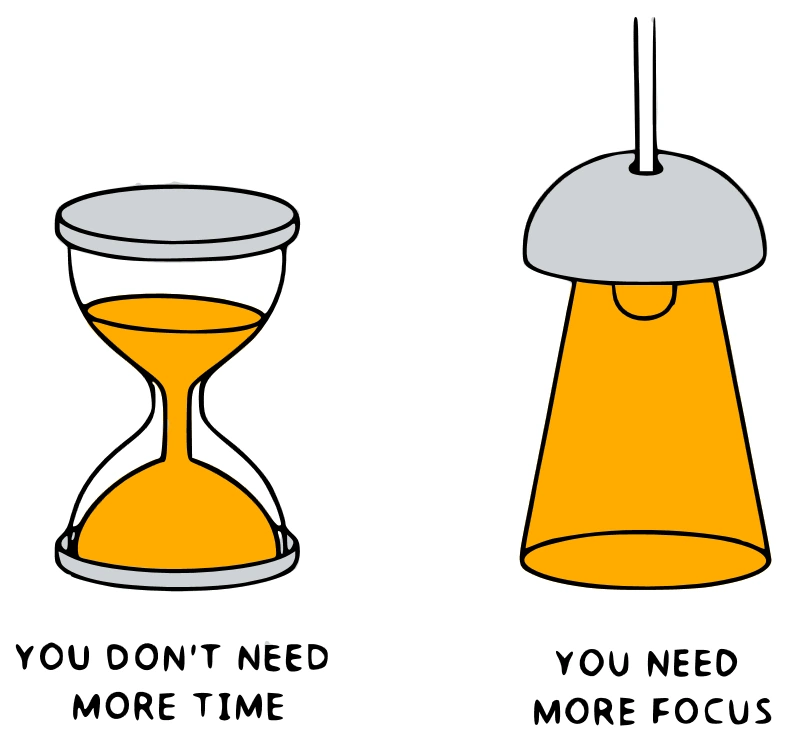In today’s fast-paced professional world, time management isn’t the true challenge for most of us — the real battle lies in managing our desire to please others.
From a young age, we’re taught to be agreeable. We nod along, take on extra tasks, join meetings we don’t need to attend, and say “yes” more often than is healthy. This well-meaning habit, however, has a hidden cost: each unnecessary “yes” steals time and energy away from the work that genuinely matters.
As productivity expert Nir Eyal wisely observes in Indistractable, “If you don’t control your time, someone else will.”
The Invisible Toll of Distractions
Modern professionals face an onslaught of interruptions. According to research by Gloria Mark at the University of California, Irvine, the average knowledge worker is interrupted every 11 minutes. Even more concerning is that it takes roughly 23 minutes to regain full concentration after each disruption.
These constant distractions don’t just nibble away at your day—they consume entire hours. Five interruptions in a single workday can cost nearly two hours of productive time. Multiply that over a week, and you’ve essentially lost a full workday.
Beyond lost hours, these disruptions erode our mental sharpness. The repeated act of switching between tasks leads to heightened stress, mental fatigue, and more frequent mistakes. Over time, we become stuck in a reactive cycle—constantly responding to emails, chats, and unscheduled requests, instead of driving forward on the work that truly moves the needle.

The People-Pleasing Dilemma
Why do so many fall into this pattern? At its core, it’s about a fear that runs deeper than simple politeness: the fear of disappointing others.
During my years at Google, I observed even the most talented professionals wrestle with this dynamic. Many would accept extra meetings or take on additional projects not because they lacked boundaries, but because they worried about upsetting colleagues or appearing uncooperative. Ironically, these efforts to maintain short-term harmony often came at the expense of long-term impact and respect.
Contrary to what many believe, setting clear, thoughtful boundaries doesn’t damage relationships — it often strengthens them. When you protect your time, you signal to others that your work matters. Over time, people respect those who prioritize substance over superficial busyness.
The Shift from Accommodating to Intentional
The most successful professionals I’ve worked with don’t just schedule their time—they fiercely protect it. They understand that focus is a precious resource, not a renewable one. In Wild Courage, I describe this approach as being “brutal with your time” — a philosophy that aligns closely with Eyal’s concept of becoming “indistractable.”
For years, I fell into the same trap: agreeing to every request, attending every meeting, and lending a hand wherever I was asked. I believed I was being collaborative, but I was really avoiding the discomfort of saying no.
When I finally began guarding my schedule as if my career depended on it (because it did), something surprising happened: no one seemed to mind. My peers weren’t keeping track of declined invitations. They respected my focus. And most importantly, I finally had the bandwidth to excel at the work that truly mattered.
The Science Behind Why Saying No Feels Hard
The discomfort we feel when declining requests isn’t imaginary—it’s hardwired into our brains. Neuroscience shows that anticipating social rejection triggers the same brain regions associated with physical pain. In evolutionary terms, being part of the group was essential for survival, so we’re naturally inclined to avoid behaviors that might risk exclusion.
But what served us on the savannah doesn’t necessarily serve us in the office. Recognizing that this discomfort is an outdated survival response can help us reframe boundary-setting as a professional strength rather than a social risk. With practice, this anxiety diminishes, allowing us to build new habits that prioritize our most valuable work.
Five Practical Strategies to Reclaim Your Focus
If you’re ready to take control of your time, here’s a roadmap you can start using immediately:
- Audit Your Calendar
Identify recurring time drains. Look for patterns—are certain meetings, individuals, or projects consuming disproportionate amounts of your attention without meaningful return? - Simplify Your No
You don’t owe anyone lengthy explanations. A simple, respectful response like “I can’t commit to this right now” is usually enough. Studies suggest that phrasing it as “can’t” rather than “don’t want to” makes the refusal feel less personal to others. - Time-Block Deep Work
Schedule focused work sessions on your calendar, treating them as immovable appointments. This technique, known as “timeboxing,” is one of the most effective ways to ensure your priorities get the attention they deserve. - Create Barriers to Interruption
Reduce accessibility when focusing. Close your office door, use “do not disturb” settings, or work from a quieter location. Small adjustments can create significant improvements in your ability to concentrate. - Batch Similar Tasks
Group activities like email, Slack, or approvals into set blocks rather than scattering them throughout the day. This minimizes task-switching and helps maintain momentum.
Scripts for Graceful Boundaries
When you need to turn down requests, these phrases can help maintain relationships while preserving your time:
- For meeting requests:
“I’d love to help. Could we start by discussing this over email? If we need more time afterward, I’m open to scheduling something.” - For timeline conflicts:
“I’m currently focused on a priority project, but I’m happy to revisit this next week if that works for you.” - For clarification on new requests:
“Could you send me a quick agenda or summary first? That will help me see where I can contribute most effectively.”
Focus Creates Traction, Not Busyness
Being perpetually busy isn’t a badge of honor—it’s often a sign of poor prioritization. Real success comes from being intentional, not from filling every available minute.
As Nir Eyal describes, the difference between traction and distraction is simple: traction moves you closer to your goals, while distraction pulls you away. High-performing professionals aren’t necessarily working longer hours; they’re simply working more focused hours, giving their energy to what matters most.
By setting clear boundaries, you’re not being difficult. You’re signaling to the world — and to yourself — that your work deserves protection. You’re creating the space necessary for your best contributions to emerge.
This week, consider one simple boundary you can set to reclaim your focus. Small changes can lead to profound shifts in your productivity, your peace of mind, and ultimately, your career trajectory.





